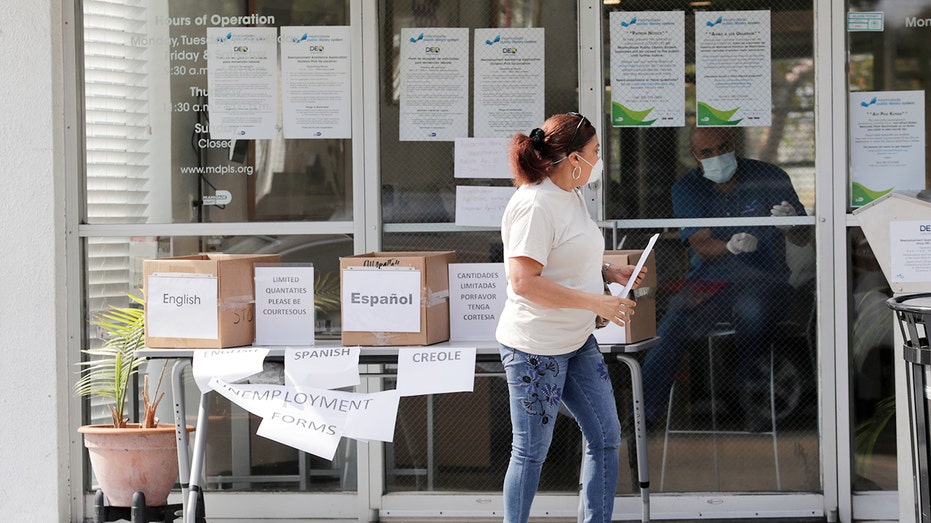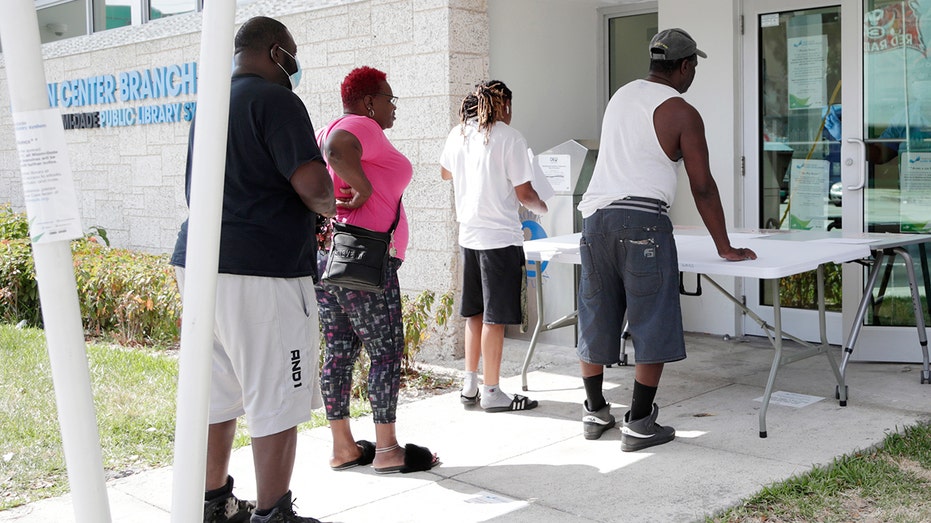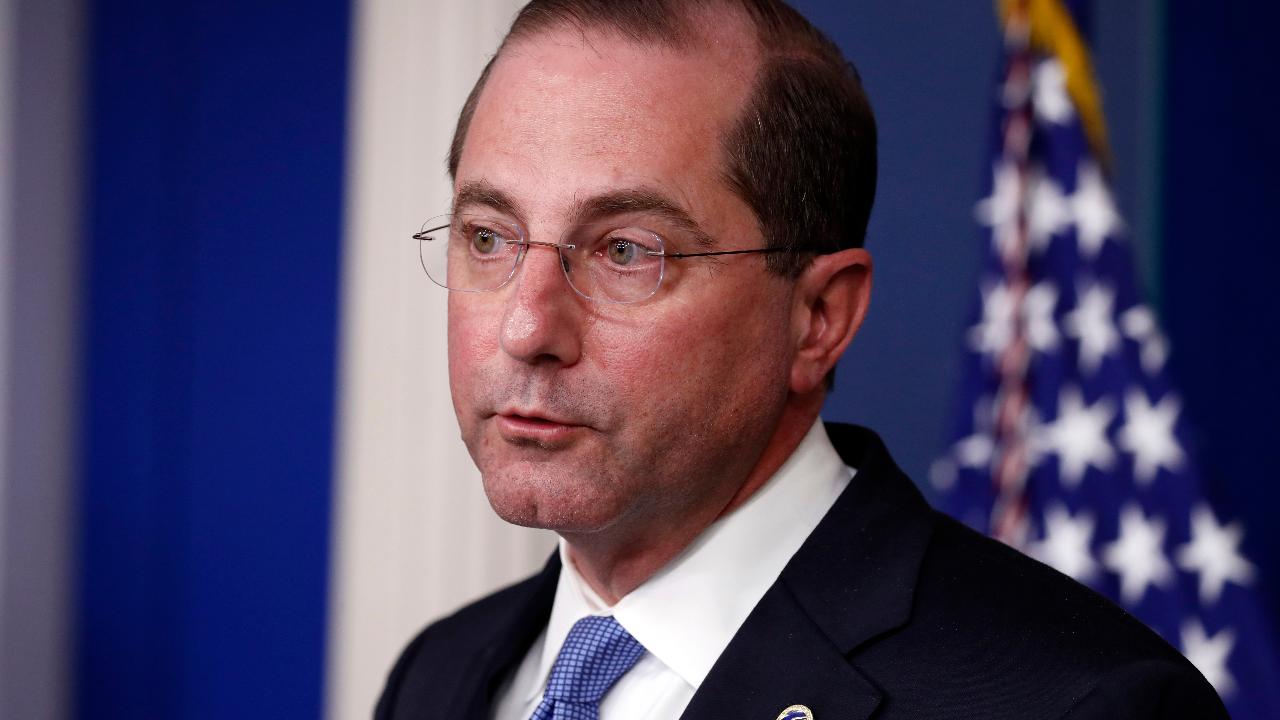Here's what to know if you must sign up for Cobra health insurance
Employees will likely be responsible for 100% of the premium plus up to a 2% administrative fee
Get all the latest news on coronavirus and more delivered daily to your inbox. Sign up here.
As millions of Americans lose their jobs -- and with them, their employer-based health insurance -- they'll need to look for other coverage.
In the middle of a pandemic, preventing gaps in health insurance coverage is likely top of mind. For some, obtaining health insurance through Cobra, or the Consolidated Omnibus Budget Reconciliation Act, may be an option. If you lost your job and are already on a spouse's plan, you probably don't have to take any action. If you're on a Marketplace plan, you may want to check if your change in income affects whether you will qualify for tax credits.
Here are some things to consider before you sign up.

In this Wednesday, April 8, 2020 photo, Aurora Ortega picks up an unemployment form at a Miami-Dade County library during the new coronavirus pandemic in Miami. (AP Photo/Lynne Sladky)
What is Cobra?
Cobra is a federally mandated insurance-continuation program that employers are, in most circumstances, required to offer workers who have been terminated. Generally, companies with more than 20 employees offer Cobra coverage to those who qualify.
WHAT IS MEDICAID, AND HOW DO YOU GET IT?
You're not required to sign up for Cobra, if you choose not to. Cobra tends to be expensive, as employees are responsible for 100% of the health benefit premium plus up to a 2% administrative fee.
What does Cobra cover?
If you choose to enroll in Cobra, you'll continue the same medical-plan coverage you had when you were working. Supplemental coverage, such as disability and life insurance, aren't covered.
Cobra enables you to keep the same doctors and maintain your existing plan.
If elected within 60 days, Cobra coverage begins on the date of the qualifying event (such as a layoff), meaning that there won't be a gap in coverage. If you lost your job, you're generally entitled to 18 months of continuous coverage. Cobra coverage is retroactive to the date you would have otherwise lost coverage.
How do I know if I'm eligible?
Check with your company, as it is required to send you information if you qualify.
AS CORONAVIRUS WORSENS, ELI LILLY LOWERS INSULIN COST
Employees who have been laid off or had their work hours reduced are typically covered. Dependents of someone who qualifies may be eligible, too.

In this Wednesday, April 8, 2020 photo, restaurant worker Glen Pile, left, waits in line to get an unemployment form at a Miami-Dade County library during the new coronavirus pandemic in Miami.(AP Photo/Lynne Sladky)
If your company has under 20 employees, or if you work for a government or religious institution, Cobra likely doesn't apply. Some states have laws similar to Cobra that are applicable to companies with under 20 employees, and other continuation of coverage laws may apply to government workers, said Rachel Leiser Levy, an employee benefits lawyer and principal of Groom Law Group in Washington, D.C.
How do I enroll?
You have 60 days to enroll in Cobra once your employer's benefits end. Your former employer or insurance carrier will send you information about coverage and how to sign up.
The Cobra election notice you receive should contain the address where you need to send premium payments along, with the amount of the premium due and its due date, according to the Centers for Medicare and Medicaid Services website.
How much does Cobra cost?
Cobra is pricey.
Employers that offer health benefits typically pay for the majority of their active employees' health premiums for those employees who qualify for those benefits, says the Kaiser Family Foundation. However, with Cobra, you'll likely be responsible for 100% of the premium plus up to a 2% administrative fee.
PRESSURE MOUNTS ON INSURANCE COMPANIES TO PAY OUT FOR CORONAVIRUS
That means your monthly payment under Cobra may be more than five times higher than your payroll deduction, according to a 2019 survey by the Kaiser Family Foundation.

Female doctor with a stethoscope and scrubs in a medical office with a young girl patient and the mother / iStock
As part of your exit, you may try to negotiate with your employer to see if it will cover your Cobra premium costs for a period of time.
"It's possible that Cobra subsidies (in which the government would pick up part or all of all of the tab of your premiums) may be included in the next federal Covid-relief package," noted Ms. Leiser Levy.
What if I have an HSA account?
If you have a health savings account, or HSA, you may pay your Cobra premiums with pretax dollars from that account without penalty, said Ms. Leiser Levy.
HSAs can be a "huge lifeline" for people that have lost their jobs and have the option to maintain coverage through Cobra, said Roy Ramthun, a consultant who specializes in high-deductible plans and HSAs. If their Cobra plan is HSA-qualified, they will be eligible to continue to make tax deductible contributions to their HSA, he said.
Who is Cobra right for?
If you want to stick with your existing doctors because you have an existing condition, such as cancer or you're pregnant, you might consider Cobra if you can afford to do so.
WHAT HAPPENS TO YOUR HEALTH INSURANCE IF YOU LOSE YOUR JOB?
If you're worried that a new plan may not cover your medications or you don't qualify for subsidies under the Affordable Care Act, you may wish to stay on your former employer's plan through Cobra since it may be cheaper in the long run, Ms. Leiser Levy says. Additionally, if you've already hit your deductible for the year, it may make financial sense.

Doctor listening to patient heartbeat in medical office / iStock
Once you receive the cost information on the Cobra election notice from your employer, you can visit HealthCare.gov to compare health-care plans that are offered under the ACA.
What are some alternatives to Cobra?
If it is an option, consider joining your spouse's employer-sponsored plan. Losing employment is typically a qualifying event to add a spouse or dependents on most plans.
If you're younger than 26, you're eligible to be covered under your parents' insurance plan, according to the Affordable Care Act.
If you join a trade or professional group, you might be able to find a lower-premium plan.
If you have insurance through your job, a job loss generally qualifies you for special enrollment under the ACA. Visit HealthCare.gov to compare plan costs and details. You must apply within 60 days of your job loss, or you may have to wait until open enrollment begins in the fall. The Marketplace offers premium subsidies to those who expect their 2020 income will be 100% to 400% of the federal poverty level: $12,490 to $49,960 per individual and $25,750 to $103,000 per family of four, according to the Kaiser Family Foundation.
If you're eligible, it may be beneficial to enroll in Medicare, before or instead of, enrolling in Cobra, according to a recent statement by the Labor Department.
GET FOX BUSINESS ON THE GO BY CLICKING HERE
If you don't enroll in Medicare and elect Cobra instead, you may have to pay a Part B late-enrollment penalty and face a gap in coverage when you decide to switch to Part B later, the Labor Department said.
You may also check if you're eligible for Medicaid by visiting the Medicaid.gov or HHS.gov websites. In the more than 30 states that adopted the ACA Medicaid expansion, adults can qualify if their current income is up to 138% of the federal poverty level, or $1,467 a month for an individual and $3,013 a month for a family of four, according to the Kaiser Family Foundation.
Unemployment compensation counts, but not the $600 federal supplement recently approved by Congress. Savings and other assets aren't taken into account, says Karen Pollitz, senior fellow at the Kaiser Family Foundation.
CLICK HERE TO READ MORE ON FOX BUSINESS




















